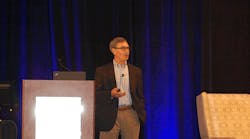Tom Wojick, president of the Renewal Group, led off his lunchtime keynote discussion about 'ROS – Return on Safety: The Key to a Sustainable ROI" with a quick description of emotional intelligence and emotional bias and how they impact our ability to make decisions. He followed that up with a pointed question: 'Why do good people make bad decisions?"
According to Wojick, "There is no such thing as a sustainable ROI without looking at the return on safety."
ROI has an allure, he acknowledged, not the least of which is:
- Profits
- Wall Street approval
- Stock appreciation
- Bonuses
- Wealth
- Fame
- Prosperity
- Power/control
But it also has its drawbacks, he noted. Some famous examples mentioned by Wojick include the Triangle Shirtwaist Factory Fire and the sinking of the Titanic. Both tragedies included shortcuts on safety made by business owners and leaders that were meant to save money but ended up costing lives and, ultimately, money and reputation.
A more recent example cited by Wojick was former Massey Energy CEO Don Blankenship, "currently on trial for what he's done in the name of ROI," said Wojick. Twenty-nine miners died because of Blankenship's focus on production at any cost, even at the cost of workers' lives.
What these leaders missed, he added, was what many companies such as Alcoa learned: "By performing on ROS, they improved and sustained their ROI."
Balancing ROS with ROI "creates a relationship that drives sustainable business results and benefits all stakeholders. ROS and ROI are not natural phenomena; they are products of leaders, and therefore leaders must be responsible stewards in order to ensure that this critical balance is maintained."

